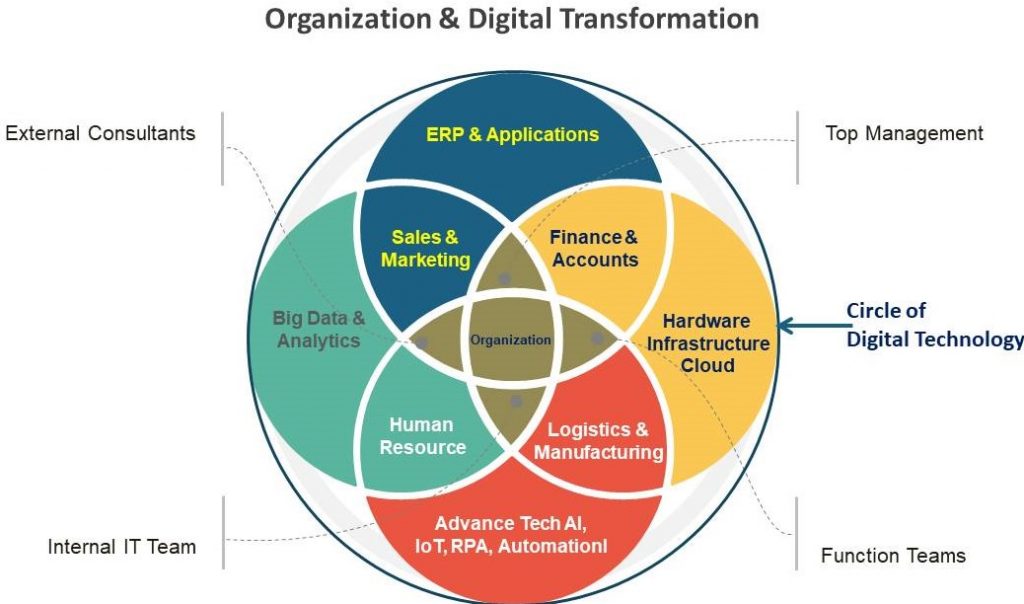A digital transformation journey has to start with a vision and firm belief by the top management. “No look back must be the way”
A success oriented Digital Transformation model:

This is an exclusive interview conducted on Digital Transformation by Santosh Vaswani, Content Writer & Editor at CIO News with S.P. Arya, Director-Technology of BizTek Advisors Pvt. Ltd.
When asked about a digital business platform, S.P. Arya, Director-Technology of BizTek Advisors Pvt. Ltd., in an exclusive interview with CIO News, said, in today’s time Digital Transformation is inevitable to survive in the new digital economy. Large-scale digital transformation projects are expensive and risky and may take years to complete. Meanwhile, agile and digitally rich competitors are eroding your market share faster than you can imagine. Therefore speed to digitalization is imperative in every organization aspiring to surpass competitors.
To meet these business challenges newer business models infused with digital innovations are being invented. These are built around multiple digital technologies and are termed as Digital business platform. Though there are many definitions floating in the digital world, which either is too complex or too simple, a Digital Platform with its key attributes can be defined as follows:
- It is an agile, technology enabled and end-to-end business model.
- It facilitates seamless exchanges between multiple groups.
- It offers a value that is proportional to the size of the community it is targeted for.
- It is a trust enabler: it must generate trust with clear general terms and conditions regarding the intellectual property and data ownership.
- It has open connectivity: it shares data with third party developers to create new services and extend the ecosystem.
- It can scale massively to address millions of consumers without performance degradation.
- It offers compelling simplistic user experience: easy to use, no training needs, self-service concept based.
- It has innovative business models based on the quick value realization.
- Finally, Digital Business Platforms are driven by artificial intelligence (AI) and are cloud-native.
When asked about the importance of digital transformation for businesses or business leaders in the new normal, he said, this abrupt and tough time of Covid-19 pandemic has rendered many of our old business practices either useless or obsolete. Everything we do now has to be scrutinized under the lens of social distancing and masking, from the way customers and staffs interact with each other to how much stock we can afford to supply. Business owners are scrambling for options that will help keep customers happy, employees working and the business liquid — options like digital transformation are becoming obvious choice. When suddenly horrible new and unknown Cvoid19 surfaced across the world and countries were forced to declare nationwide lockdowns, the IT teams and vendors mobilized their minds and brought forward the much hated and delayed concept of work from home to forefront which kept organizations working, though at slower but stable pace and businesses remained in business with employees working from home.
IT was the time when business owners who were reluctant to implement work from home (WFH) practices suddenly realised the advantage of this new normal. Many technology companies have decided to keep this continued while rest like manufacturing units have decided to invest in digital automations across all streams to minimise the presence of human resource. Data services usage have surged to new high to keep meetings, webinars and trainings on via online video call platforms and online businesses delivering each and every product at your doorstep. Though the DT journey is not a straight line ever but business wants to start it to keep business agility high and remain competitive and liquid.
When asked about the culture an organisation needs for digital transformation, he said, the organization starting a long journey called Digital Transformation, must inculcate a culture of digital thinking, starting from top management to lowest level in the organization. They must think and act in a digital way only. A capable and strong team of professionals lead by a Chief Digital Officer (CDO) must drive the digital transformation journey.
When asked about a starting point of digital transformation for businesses, he said a digital transformation journey has to start with a vision and firm belief by the top management. “No look back must be the way”. A journey leader is declared and the teams are formed, external consultants are hired, all heads put together to chalk out a meticulous plan, budgets are cleared, technologies are identified, war rooms are engaged in intense discussions, project is monitored at all levels and run under maximum control, critical issues are addressed on priority.
Now under post pandemic new normal, the processes which can be performed remotely to run the business are the prime candidates and should be taken on priority. Connectivity anywhere anytime must be ensured before putting processes to work from home or remote. And above all choosing the right and latest hardware/cloud & software technology is the key to the success in achieving best class in digital transformation.
When asked about the barriers blocking the way to digital transformation, he said, for me the list of key barriers in implementing Digital Transformation are not same across various business verticals and vary based on multiple factors. However there are key common barriers which you will find across all segments, which can be summarise as follows:
- Inadequate continuous Involvement of top management and participate in reviews
- Insufficient budget allocation for a complete journey
- Change management is not taken seriously
- Inadequacy of required workforce with right digital skillsets.
- Wrong selection of digital solutions
- Lack of coordination among internal teams as well external teams working on parallel digital projects.
- Not able to harness the power of Data analytics, despite having large volume of data generated.
- Inability to gain enough buy in from all stake holders
- Not able to achieve ROI envisaged at the start of the project.
- Not assessing the risks and their timely mitigation
- Project gets stretched beyond a limit where everyone loses interest
- Integration issues: can’t join data silos in organization that leads to data chaos.
He said, on an ending note let me just put into your notice that a surge in digital transformation initiatives has been observed and is good sign for the digital world. Let us wish it changes the world and we see whole new ways businesses are run.
Also read: Digital transformation: A required change and a new operating model in the BFSI industry
Do Follow: CIO News LinkedIn Account | CIO News Facebook | CIO News Youtube | CIO News Twitter







Nicely written article. It points out to the fact that the world has resorted to the concept of work from home, something that the world was reluctant to do in the pre covid phase but now has no option but to adopt to this concept owing to the new normal.
Very good article.